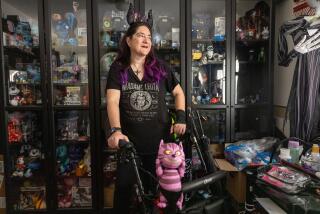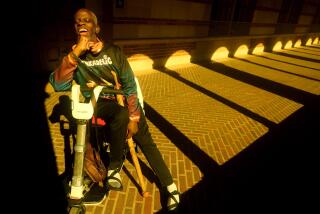Special Troopers : Developmentally Disabled Enjoy Sense of Accomplishment
- Share via
John Shuffler marched across the manicured grounds of Camarillo State Hospital leading a troop of 13 other developmentally disabled Explorer Scouts.
When they reached the flagpole, Shuffler, who has Down’s syndrome, turned and faced the troop. The Scouts, ranging in age from 28 to 42, stood in a haphazard line, adjusting their red neckerchiefs and berets.
“I pledge allegiance to the flag of the United States of America,” began Shuffler, his right hand covering his heart. One by one, the other Scouts joined in as volunteer Scout leader Sam Rosen watched proudly.
“They may not know everything about the flag, but they know about standing at attention and saluting it,” Rosen said. “They take it real seriously.”
After the ceremony, the Scouts gathered solemnly around a tree they planted several years ago. With their heads bowed, they observed a moment of silence in honor of Phyllis Gilbert, a former Scout official who died two weeks ago. Rosen said the Scouts will plant a tree in Gilbert’s memory next month.
For nearly 25 years, Rosen has been leader of Troop 9962 at Camarillo State Hospital. In 1968, after working at the hospital for two years, Rosen approached hospital officials and proposed forming the group.
Since then, Camarillo patients with disabilities such as Down’s syndrome, a congenital disease that results in diminished mental capacity, have been able to enjoy the pride and sense of accomplishment that come with being a Scout.
“It gives them an opportunity for social interaction,” said assistant leader Gene West, whose 29-year-old son, Patrick, has been in the troop for four years. “It gives them a chance to do projects that they don’t normally get a chance to do.”
There were almost 50 Scouts in the Explorer post at one time, Rosen said. But over the years, many of them have been discharged from the hospital to facilities in Camarillo.
Spencer Moore, national spokesman for the Boy Scouts of America, said James West, a founding executive of the U. S. scouting organization, was disabled and recognized the needs of those with severe disabilities. In 1965, registration of overage, mentally disabled Scouts began, Moore said.
“Explorer Scouts allow mentally disabled boys and girls to do things that are equivalent to the things expected of regular Boy Scouts,” he said.
There are about 225 Explorer posts for developmentally disabled Scouts in the United States, with about 3,950 members, Moore said.
Although the Explorer post at Camarillo State Hospital operates under the aegis of the Boy Scouts, Rosen said his troop’s disabilities prohibit most of the program’s rigorous activities.
“They can’t hike or tie the different knots, but they do other things that are just as important,” Rosen said.
The Scouts planted trees at the hospital last year in honor of the American hostages who were being held in Lebanon and, in 1986, in memory of the astronauts killed in the explosion of the space shuttle Challenger, he said.
One of the most memorable events for the Scouts, Rosen said, occurred several years ago when the troop served as honor guard for Nancy Reagan.
“She was visiting the hospital to address a group of foster grandparents,” Rosen recalled. Most of the Scouts “didn’t really understand how important she was, that she was the President’s wife, but they still did a great job.”
Another highlight came 10 years ago when the troop led the flag salute at the Special Olympics in Los Angeles, Rosen said.
The Scouts recently started a garden in the hospital’s courtyard and wrote get-well cards to basketball star Earvin (Magic) Johnson after the announcement that Johnson had tested HIV-positive, Rosen said.
A majority of the troop’s funding comes from donations made by the Green Line Parents Group, made up of parents, relatives and friends of patients involved in the Scout program, said Rose Zachowski, Green Line president.
The group’s name came from a green line painted on the sidewalk at the hospital that directs visitors from the front entrance to the developmentally disabled ward.
Besides providing money to the troop for projects and holiday parties, Zachowski said the group also serves as a watchdog--keeping an eye on legislation presented in Sacramento related to the developmentally disabled.
“Green Line is not just for our own children but for all mentally disabled children, especially the ones who don’t have any family support,” she said. “Over the years, there has been tremendous improvement at the state development centers and an increase in community involvement, and we want to keep it that way.”
Zachowski credits Rosen and the Explorer post for increasing the amount of rehabilitation and training that the developmentally disabled patients at the hospital receive.
“It really makes a difference in their attitudes,” she said. “Being Scouts widens their social circle. They learn how to do things with other people, like planting the trees or growing a garden.”
This year, the Scouts will again perform the flag salute at the Special Olympics, Rosen said. He also hopes to get other troops from Ventura County to visit the hospital and share their scouting experiences.
“Scouts in outside troops can earn their merit badges by learning about others with disabilities,” he said. “It’s also good for my Scouts to mingle with people outside the hospital. It breaks the hospital syndrome.”
When asked about the longevity of the Explorer program, Rosen laughed.
“I thought this thing was going to peter out a long time ago,” he said. “I thought the Scouts would get too old, but they just keep on going.”


